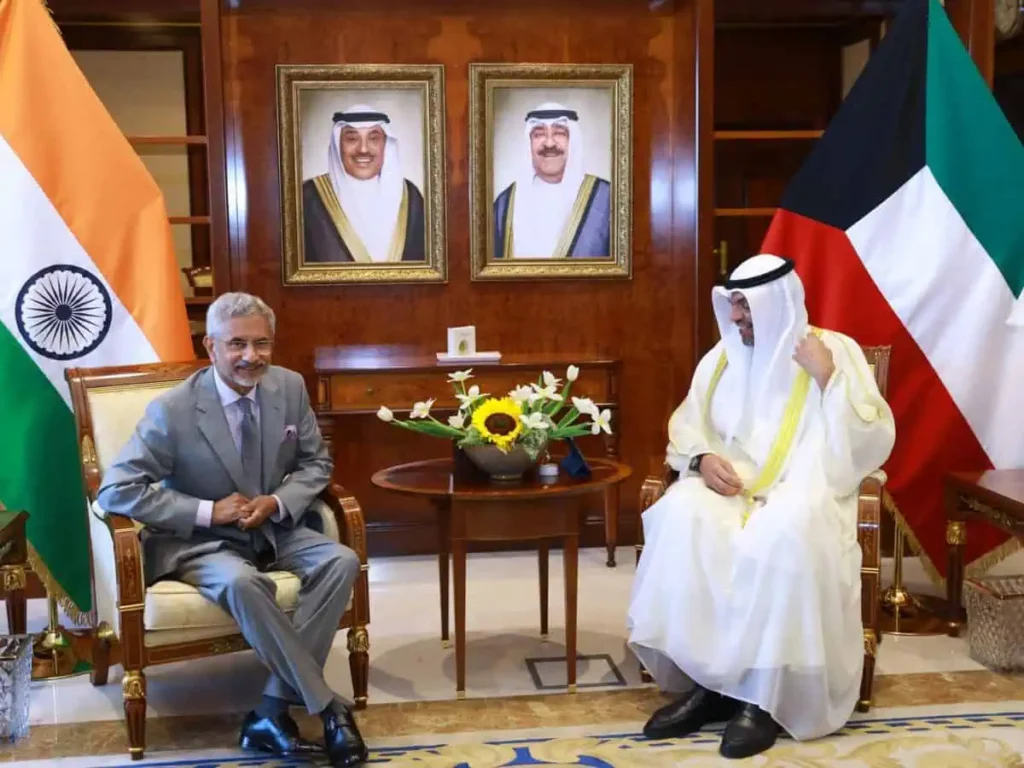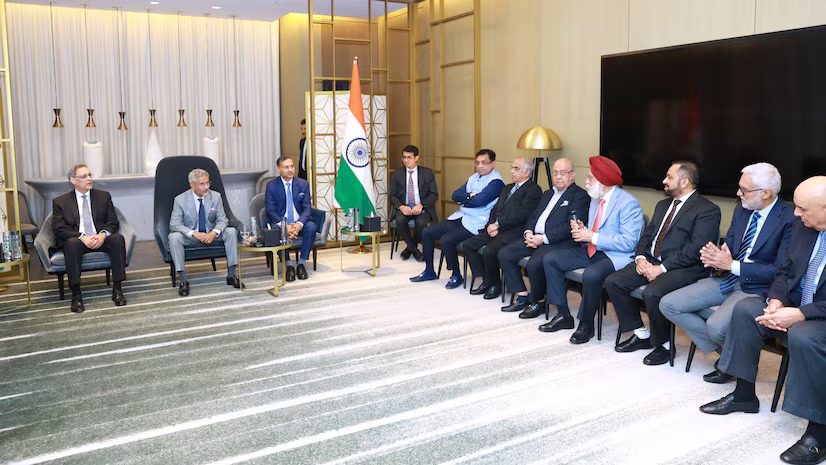External Affairs Minister (EAM) Dr. S. Jaishankar paid an official visit to Kuwait on August 18, 2024, in a significant diplomatic effort to reinforce the longstanding bilateral ties between India and the State of Kuwait. The visit aimed to enhance cooperation across multiple sectors and explore new avenues for collaboration between the two nations.
During his visit, Dr. Jaishankar held high-level meetings with Kuwait’s Crown Prince Sheikh Sabah Al-Khaled Al-Sabah and Prime Minister Sheikh Dr. Muhammad Sabah Al-Salem Al-Sabah. The discussions revolved around expanding trade, economic cooperation, investment opportunities, and regional stability. The meetings highlighted India’s commitment to fostering deeper diplomatic and economic engagement with Kuwait.
Strengthening Political and Diplomatic Relations
Dr. Jaishankar’s meeting with Crown Prince Sheikh Sabah Al-Khaled Al-Sabah was a crucial step in furthering diplomatic relations. During the discussion, Dr. Jaishankar conveyed greetings from India’s leadership and reiterated the strong historical ties between the two countries. India and Kuwait have shared a long-standing relationship based on mutual trust, economic cooperation, and cultural exchanges.

The External Affairs Minister emphasized the importance of continuing this positive momentum, acknowledging the key role that both nations play in regional stability. The leaders discussed ways to elevate the India-Kuwait partnership, particularly in the areas of political collaboration, regional security, and global economic affairs.
Economic and Trade Cooperation
In his discussions with Kuwaiti Prime Minister Sheikh Dr. Muhammad Sabah Al-Salem Al-Sabah, Dr. Jaishankar focused on strengthening economic relations and deepening bilateral trade ties. India and Kuwait have a strong trade relationship, with bilateral trade reaching approximately USD 10.47 billion during the 2023-24 period. Kuwait is one of India’s key suppliers of crude oil, while India exports machinery, electronics, food products, and textiles to Kuwait.
During the meeting, both sides expressed their interest in diversifying trade and investment partnerships beyond traditional sectors. There was a strong push to explore opportunities in energy, technology, and infrastructure. India’s growing technology and start-up ecosystem were highlighted as key areas where Kuwait could benefit from investment and knowledge exchange. Additionally, both sides discussed the importance of supply chain resilience and food security, considering the global economic challenges.
Foreign Policy and Regional Stability
One of the significant aspects of Dr. Jaishankar’s visit was his meeting with Kuwait’s Foreign Minister, H.E. Abdullah Ali Al-Yahya. This engagement focused on several critical issues, including regional security, geopolitical concerns, and strategic international partnerships. India and Kuwait share common interests in maintaining regional peace and stability, particularly in the Middle East and the Gulf region.
The discussions also covered global diplomatic efforts and India’s increasing role on the international stage. India has emerged as a key player in global diplomacy, actively engaging with Gulf countries to enhance trade, defense cooperation, and cultural exchanges. Kuwait expressed its appreciation for India’s role in ensuring global stability and economic development.
Focus on Indian Community in Kuwait
A crucial element of Dr. Jaishankar’s visit was his interaction with the vibrant Indian expatriate community in Kuwait. With approximately 640,000 Indians residing in Kuwait, the Indian diaspora plays a vital role in the country’s economic and social landscape. Indian professionals, including doctors, engineers, IT specialists, and educators, contribute significantly to Kuwait’s development.
During his address to the Indian community, Dr. Jaishankar acknowledged their hard work and dedication. He also assured them of the Indian government’s continued support in addressing their concerns, including labor rights, consular services, and welfare programs. The minister highlighted the significant role the Indian community plays in strengthening people-to-people ties between the two nations.
Defense and Strategic Partnerships
India and Kuwait’s relationship is not only limited to trade and diplomacy but has also expanded to defense cooperation in recent years. The visit of Indian naval ships to Kuwaiti ports and the discussions on navy-to-navy cooperation mark an important step in strengthening strategic ties. The two nations are exploring joint military training, maritime security collaboration, and defense technology sharing.
Kuwait’s strategic location in the Gulf region makes it an important partner for India’s defense and security interests. Both nations recognize the need for greater cooperation in counter-terrorism efforts, cybersecurity, and intelligence sharing. Dr. Jaishankar’s visit reinforced India’s commitment to working closely with Kuwait to address regional security challenges.
Cultural and Educational Collaborations
India and Kuwait share deep cultural ties, with both nations benefiting from rich historical exchanges. Indian cultural festivals, music, and cuisine are widely appreciated in Kuwait, reflecting the strong people-to-people connection. The two countries are also exploring initiatives in education and skill development, particularly in higher education and vocational training.
Kuwait has shown interest in collaborating with Indian institutions to facilitate student exchange programs and research partnerships. The growing presence of Indian educational institutions in the Gulf region is a testament to India’s expertise in higher education and professional training. Dr. Jaishankar’s visit further strengthened discussions on expanding cultural and educational engagements.
Future Prospects and Conclusion
Dr. Jaishankar’s visit to Kuwait reaffirmed the strong diplomatic, economic, and cultural ties between the two nations. The high-level meetings with Kuwaiti leadership underscored the commitment of both countries to furthering their partnership in various sectors, including trade, energy, defense, and education.
India and Kuwait’s relationship continues to evolve, adapting to the changing global landscape. The visit highlighted the potential for enhanced collaboration in technology, investment, and regional security. Both sides expressed optimism about the future of their partnership and pledged to work together to address global challenges and promote economic growth.
The visit sets the stage for deeper engagement, ensuring that India and Kuwait’s longstanding friendship continues to thrive in the years to come. With ongoing discussions and mutual cooperation, the India-Kuwait partnership is poised for significant growth, benefiting both nations and their people.
Kuwait’s New Visa Policy: Domestic Workers Permitted to Transfer to Private Sector



